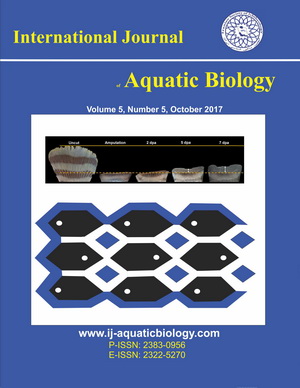Effects of dietary vitamin C supplementation on some oxidative status biomarkers in erythrocytes of common carp (Cyprinus carpio)
Downloads
Regarding to the high content of polyunsaturated fatty acids in fish tissues, improving the fish antioxidant status seems to be necessary and may be associated with beneficial effects on fish health. The present study aimed to investigate the effects of dietary vitamin C supplementation (20 mg/kg body weight, 4 weeks) on some oxidative status biomarkers in RBC of common carp (Cyprinus carpio). The results showed that the activities of antioxidant enzymes including catalase (CAT), glutathione peroxidase (GPx) and superoxide dismutase (SOD) were not changed significantly following dietary vitamin C supplementation in comparison to the control group. Moreover, dietary vitamin C supplementation for 28 days significantly lowered malondialdehyde (MDA) concentration in erythrocyte haemolysate by approximately 26% compared to that of the control group. In conclusion, dietary vitamin C supplementation appears to be able to protect carp erythrocytes against oxidative stress by decreasing lipid peroxidation.
Downloads
Abd Ellah M.R. (2010). Involvement of free radicals in animal diseases. Comparative Clinical Pathology, 19: 615-619.
Asaikkutti A., Bhavan P.S., Vimala K., Karthik M., Cheruparambath P. (2016). Effect of different levels of dietary vitamin C on growth performance, muscle composition, antioxidant and enzyme activity of Macrobrachium rosenbergii. Aquaculture Reports, 3: 229-236.
Ashley L.M., Halver J.E., Smith R.R. (1975). The pathology of fishes. The University of Wisconsin Press, Wisconsin. pp: 769-786.
Aydemir T., Oztí¼rk R., Bozkaya L.A., Tarhan L. (2000). Effects of antioxidant vitamins A, C, E and trace elements Cu, Se on CuZn SOD, GSH-Px, CAT and LPO levels in chicken erythrocytes. Cell Biochemistry Function, 18(2): 109-115.
Balasenthil S., Arivazhagan S., Nagini S. (2000). Garlic enhances circulatory antioxidants during 7, 12-dimethylbenz[a]anthracene-induced hamster buccal pouch carcinogenesis. Journal of Ethnopharmacology, 72: 429-433.
Birben E., Sahiner U.M., Sackesen C., Erzurum S., Kalayci O. (2012). Oxidative stress and antioxidant defense. World Allergy Organization Journal, 5(1): 9-19.
Chien L.T., Hwang D.F. (2001). Effects of thermal stress and vitamin C in lipid peroxidation and fatty acid composition in the liver of thornfish Terapon jarbua. Comparative Biochemistry Physiology, 128B: 91-97.
Claiborne A. (1986). Catalase activity. In: R.A. Greenwald (Ed.). Handbook of methods for oxygen radical research, CRC Press, Boca Raton (FL). pp: 283–284
Clemens M.R., Waller H.D. (1987). Lipid peroxidation in erythrocytes. Chemistry and Physics of Lipids, 45: 251-268.
Feller A.G., Rudman D. (1988). Role of carnitine in human nutrition. Journal of Nutrition, 118: 541-547.
Gabryelak T., Filipiak A., Brichon G. (2000). Effects of zinc on lipids of erythrocytes from carp (Cyprinus carpio L.) acclimated to different temperatures. Comparative Biochemistry Physiology, 127C: 335-343.
Combs Jr. G.F. (1998). The Vitamins: Fundamental Aspects in Nutrition and Health. 2nd ed. Academic Press, London. pp: 246-275.
Gouillou-Coustans M.F., Bergot P., Kaushik S.J. (1998). Dietary ascorbic acid needs of common carp (Cyprinus carpio) larvae. Aquaculture, 161: 453-461.
Harvey J.W. (1997). The erythrocyte: physiology, metabolism and biochemical disorders. In: J.J. Kaneko, J.W. Harvey, M.L. Bruss (Eds.). Clinical biochemistry of domestic animals. 5th edition, Academic Press, London. pp: 182-184.
Hwang D.F., Lin T.K. (2002). Effect of temperature on dietary vitamin C requirement and lipid in common carp. Comparative Biochemistry and Physiology, 131B: 1-7.
Johnston C., Meyer C., Srilakshmi J. (1993). Vitamin C elevates red blood cell glutathione in healthy adults. American Journal of Clinical Nutrition, 58: 103-105.
Kontush A., Finckh B., Karten B., Kohlschutter A., Beisiegel U. (1996). Antioxidant and prooxidant activity of a-tocopherol in human plasma and low density lipoprotein. Journal of Lipid Research, 37: 1436-1448.
Latha M., Pari L. (2003). Preventive effects of Cassia auriculata L. flowers on brain lipid peroxidation in rats treated with streptozotocin. Molecular and Cellular Biochemistry, 243: 23-28.
Li H., Tu H., Wang Y., Levine M. (2012). Vitamin C in mouse and human red blood cells: an HPLC assay. Analytical Biochemistry, 426(2): 109–117.
Meydani S.N. (1993). Vitamin, mineral supplementation, the aging immune response, and risk of infection. Nutrition Review, 51: 106-115.
Miller J.K., Brzezinska-Slebodzinska E., Madsen F.C. (1993). Oxidative stress, antioxidants, and animal function. Journal of Dairy Science, 76: 2812-2823.
Mohebbi A., Nematollahi A., Ebrahimi Dorcheh E., Goodarzian Asad F. (2012). Influence of dietary garlic (Allium sativum) on the antioxidative status of rainbow trout (Oncorhynchus mykiss). Aquaculture Research, 43 (8): 1184-93.
Monget A.L., Richard M.J., Cournot M. (1996). Effect of 6 months supplementation with different combinations of an association of antioxidant nutrients on biochemical parameters and markers of the antioxidant defence system in the elderly. European Journal of Clinical Nutrition, 50: 443-449.
Nagasaka R., Okamoto N., Ushio H. (2004). Partial oxidative-stress perturbs membrane permeability and fluidity of fish nucleated red blood cells. Comparative Biochemistry and Physiology, 139C: 259-266.
Naeiji N., Shahsavani D., Baghshani H. (2013). Effect of dietary garlic supplementation on lipid peroxidation and protein oxidation biomarkers of tissues as well as some serum biochemical parameters in common carp Cyprinus carpio. Fisheries Science, 79: 699-705.
Nazifi S., Ghafari N., Farshneshani F., Rahsepar M., Razavi S.M. (2010). Reference values of oxidative stress parameters in adult Iranian fat-tailed sheep. Pakistan Veterinary Journal, 30(1): 13-16
NRC (1993). Nutrient Requirements of Fish. National Academy Press, Washington, DC. USA. 114 p.
Prakash N., Banerji H.N. (1972). Evaluation of cyanmethaemoglobin method for haemoglobin estimation. Indian Journal of Chest Diseases, 14(2): 102-105.
Puangkaew J., Kiron V., Satoh S., Watanabe T. (2005). Antioxidant defense of rainbow trout (Oncorhynchus mykiss) in relation to dietary n-3 highly unsaturated fatty acids and vitamin E contents. Comparative Biochemistry and Physiology, 140C: 187-196
Roche H., Boge G. (1993). Effects of Cu, Zn and Cr salts on antioxidant enzyme activities in vitro of red blood cells of a marine fish Dicentrarchus labrax. Toxicology in Vitro, 7(5): 623-629.
Sies H., Stahl W., Sevanian A. (2005). Nutritional, dietary and postprandial oxidative stress. Journal Nutrition, 135: 969-972.
Treves-Brown K.M. (2000). Applied Fish Pharmacology. Kluwer Academic Publishers, Dordrecht, pp: 3-15.
Welker T.L., Congleton J.L. (2009). Effect of dietary alpha-tocopherol + ascorbic acid, selenium, and iron on oxidative stress in sub-yearling Chinook salmon (Oncorhynchus tshawytscha Walbaum). Journal Animal Physiology Animal Nutrition, 93: 15-25.
Winston G.W., Di Giulio R.T. (1991). Prooxidant and antioxidant mechanisms in aquatic organisms. Aquatic Toxicology, 19: 137-161.
Yonar M.E., Sakin F. (2011). Ameliorative effect of lycopene on antioxidant status in Cyprinus carpio during pyrethroid deltamethrin exposure. Pesticide Biochemistry and Physiology, 99: 226-231.
Zhou X., Xie M., Niu C., Sun R. (2003). The effects of dietary vitamin C on growth, liver vitamin C and serum cortisol in stressed and unstressed juvenile soft-shelled turtles (Pelodiscus sinensis). Comparative Biochemistry and Physiology, 135A(2): 263-270.








